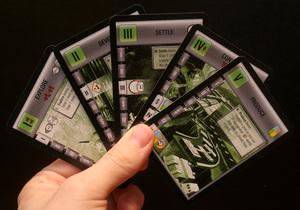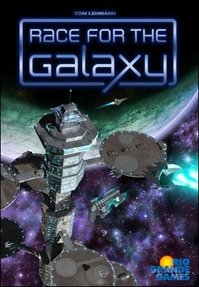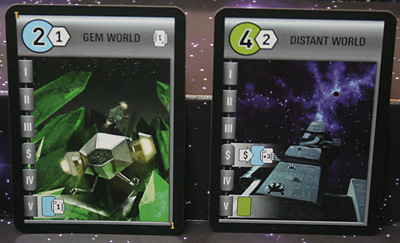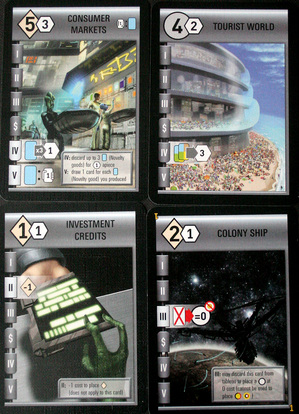Race for the Galaxy: a heavy learning curve but worth the effort

Mike Hulsebus | Contributor
Race for the Galaxy is a futuristic card game in which 2-4 players try to settle the galaxy's planets. The most interesting thing about the game is how the phases of the game work. During each turn, players choose from five different phases that they want to happen: Explore, Develop, Settle, Produce and Consume. Then, all players do those phases and whoever picked each phase gets to do that phase at a bonus. As for phases that no one picked, those don't happen that particular round. So in terms of turn structure, Race for the Galaxy has a very different turn structure.
But of course a cool mechanic alone does not make a good game and Race for the Galaxy is a deck of slightly more than 110 cards for $30. Let's have a look at how the game works, how it plays, and the type of player to whom it would appeal.

Just like you can't talk about Race without talking about the mechanics, you also can't talk about it without discussing the iconography. The game has a decently steep learning curve since each card's functions have been summarized into icons. They're absolutely essential since players will have enough cards in front of them that they need to be able to look at the cards and know what they do at a glance. New players, however, will have to pick up the cards over time. It takes a game or two to start to really get a handle on the cards, but luckily there are reference sheets that cover a lot of the initial questions.
A great thing about the game is that it has a huge amount of decisions. Developments are worlds paid for by discarding cards from your hand. So you might have a seven-card hand with a card that you could play by discarding everything this turn. Or instead, you could opt try to play a few cheaper cards over the next few turns. Every time you play a card, you're not only choosing what cards to play, but also what cards not to play as you put them in the discard pile to pay for your choice.

The world on the left produces one novelty good and draws you a card every time the production phase happens. Notice how this combines well with the Distant World that gives you bonus 3 cards when you sell a novelty good.
Mike Hulsebus | Contributor
Race for the Galaxy is a game that takes a game or two to figure out, and I have to say that it's worth it. I'm excited to continue to learn it, but I'm not sure how I'm going to convince people to play it: “Hey, so let's play a game, but let's agree to play it twice in a row and the first time you play you'll be lost and unsure what to do.” So while Race for the Galaxy is a fun game to learn with a group of people, it's probably not the game you want to bring to your next family gathering.
The game also isn't for people that want a lot of confrontation in their games. Maybe I have still getting a hold of the strategy of the game, but my turns seem to influence my opponents in the same way that my rolls in Yahtzee influence other players.

Mike Hulsebus | Contributor
I've talked a lot, so far, about the problems with Race for the Galaxy. I have just a couple games logged at this point, but I enjoy the game. I like building my set of planets and trying to find what series of cards will work well together off one another. It's fun starting with a planet that has one small special ability and taking it to a large group of planets that does a lot of the things well.
The game crams a lot of action into the time it takes. So overall it makes the game not only feel like it was worth the time, but also worth the money. If you've got a dedicated group of people who enjoy learning new rules and figuring out a new system, Race for the Galaxy is worth picking up.
Mike Hulsebus would rather play Yahtzee with a group so people can appreciate the rare two Yahtzee games. Leave comments below or email him at mikehulsebus@gmail.com


Comments
Mike Hulsebus
Tue, May 18, 2010 : 10:43 p.m.
Thanks for the comment John. Yeah, it's not fair to say that it's just like Yahtzee because it is true that you have to time your game based on what other people are doing. And I totally get what you mean about liking it more the more you play it. It definitely has the gears in my head turning right now.
John Curran
Tue, May 18, 2010 : 9:38 a.m.
I agree with most of what you say, but it is *not* Yahtzee. I think you will find that you do need to pay attention to what other players are doing to play well. The obvious reason is pace. There are two different ways for the game to end, and you need to make sure you have time to do what you plan. Just as important, you need to squeeze as many points as possible from each turn. It's sometimes worth gambling that someone else will play a phase you need, so that you can take a bonus on a different phase. (E.g. I want to play a medium-cost development, but it will cost me all my cards, one of which is an important bonus card. My opponent has two cards in hand, and based on his display he probably can't build or develop himself. I will assume he will draw cards, so that I will have an extra to protect my bonus card. Then I can choose some other phase to help myself out.) You especially need to be careful about the timing of production and consumption. You'll find out soon enough. :) If interaction is what you like,the 2nd and 3rd expansions allow for a kind of warfare, where you can take over other players' cards. The more I play this game, the more I like it. There are many strategies to discover.